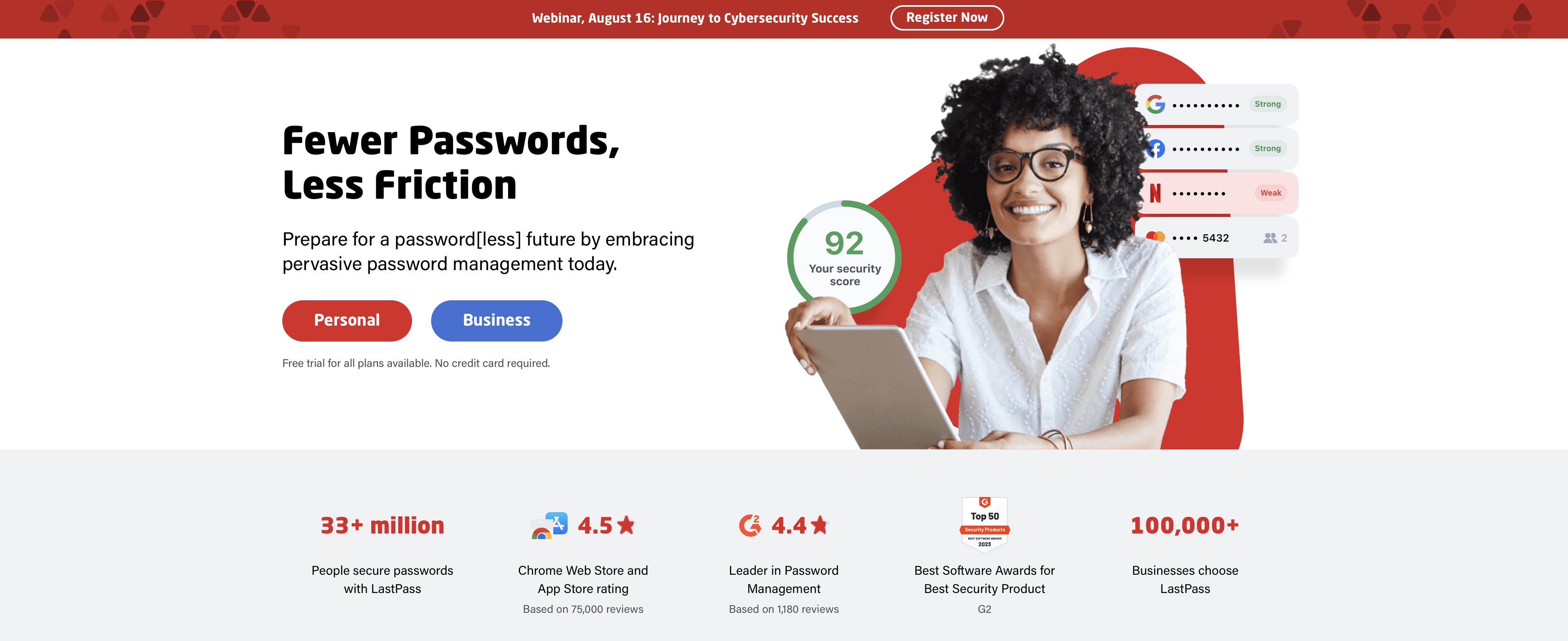TechRadar Verdict
LastPass is certainly among the best password managers. The free version is excellent, but it's well worth upgrading to a premium account for the benefit of app logins.
Pros
- +
Best-in-class security framework
- +
Multi-platform support
- +
Support for passkeys and metaverse
- +
Free version available
Cons
- -
Free plan is limited
- -
Can get expensive once you add features
Why you can trust TechRadar
There aren’t many bigger names in password management than LastPass. This hugely popular app is powered by LogMeIn, which is one of the world’s largest SaaS companies, and it’s been around since 2008. Yet, despite its serious business-focused background and impressive credentials, it still serves as a legitimately good proposition for individuals, too.
There are some compelling reasons for LastPass’s enviable success. It’s got good security policies and best-in-class features, including easy sharing and impressive password-generation modules, and it also includes dark web monitoring and biometric login. It’s also among a growing number of password managers to be adding support for passkeys.
It’s certainly not the only app to offer these abilities, though, so LastPass will have to impress if it wants to maintain its place in our round-up of the best password managers as well as best business password managers.
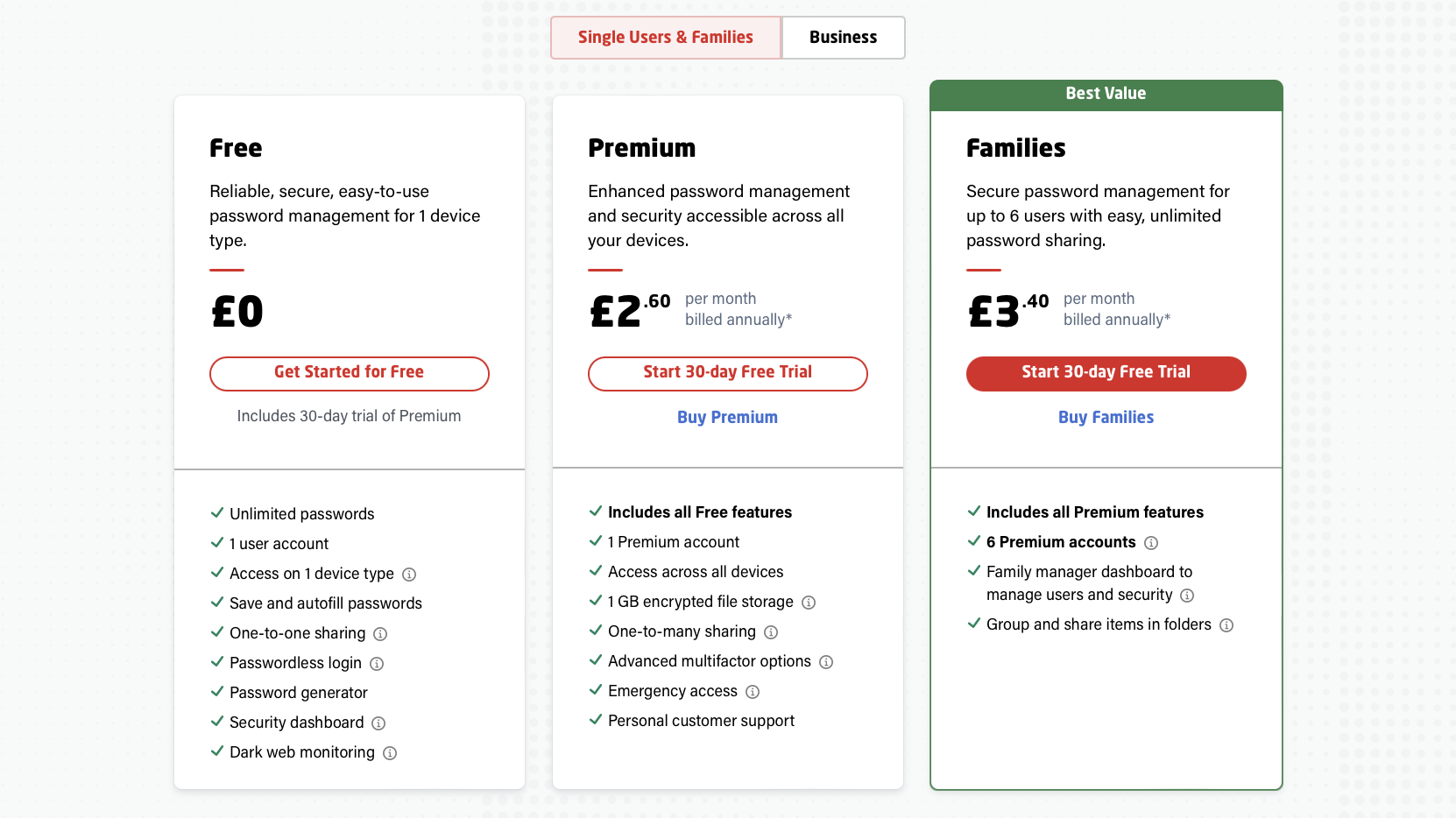
LastPass: Plans and pricing
Unveiling the Latest LastPass Pricing: What's in Store for 2023?
As cybersecurity concerns continue to escalate, the imperative for robust password management solutions has never been more pronounced. LastPass, a leading name in the sector, has adapted its pricing structure in a bid to cater to a wider audience while offering sophisticated security measures. In this blog post, we'll delve into the latest LastPass pricing plans for 2023, examining the offerings and enhancements designed to meet the diverse needs of individual users and businesses alike.
Before we dive into the pricing details, let's briefly overview what LastPass brings to the table. LastPass is a comprehensive password management tool that stores encrypted passwords online. The basic service allows users to store passwords, generate secure passwords, and fill forms automatically. The information is accessible through a master password. LastPass offers various tiers, catering to individual users, families, and businesses, ensuring that there's a solution for every need.
Free Tier: LastPass offers a free version designed for individual users. It provides the basics: access on all devices, password storage, secure notes, and password generation. However, it lacks advanced security features and the ability to share more than a limited number of items.
Premium Tier: Priced at $3 per month (when billed annually), the Premium plan adds dark web monitoring, advanced multi-factor options, and priority tech support to the mix. It's designed for individual users looking for an extra layer of security.
Families Tier: At $4 per month (billed annually), the Families plan covers up to 6 users. It includes all Premium features plus a family dashboard for easy management and shared folders.
Teams Tier: Targeted at smaller teams, this plan costs $4 per user per month (billed annually) and includes all Premium features plus single sign-on for up to 3 applications and basic reporting.
Business Tier: Priced at $7 per user per month (when billed annually), the Business tier is suited for larger organizations. It builds on the Teams tier by adding advanced reporting, single sign-on for unlimited applications, automated user management, and API access for custom integrations.
Enterprise Tier: For enterprises requiring the utmost in security and customization, LastPass offers tailored solutions. Pricing for the Enterprise tier depends on the specific needs and scale of the business, encompassing all Business tier features plus dedicated customer support, advanced security measures, and integration options.
Selecting the appropriate LastPass plan hinges on your specific needs:
Individuals seeking a no-frills password manager might find the Free tier sufficient. However, for those requiring enhanced security features, the Premium tier is a worthwhile upgrade.
Families looking to manage their passwords collectively will benefit significantly from the added flexibility and shared capabilities of the Families tier.
Small businesses and teams can streamline their password management and enhance security with the Teams tier, while larger organizations will find the comprehensive features of the Business and Enterprise tiers indispensable for their operations.
LastPass's revised pricing strategy for 2024 reflects its commitment to providing a secured digital experience for individuals and businesses. By offering a range of plans tailored to different needs and budgets, LastPass ensures that everyone, from individual users to large corporations, can find a solution that meets their security requirements without breaking the bank. As cyber threats evolve, investing in a reliable password manager like LastPass is a step forward in safeguarding your digital identity and assets.
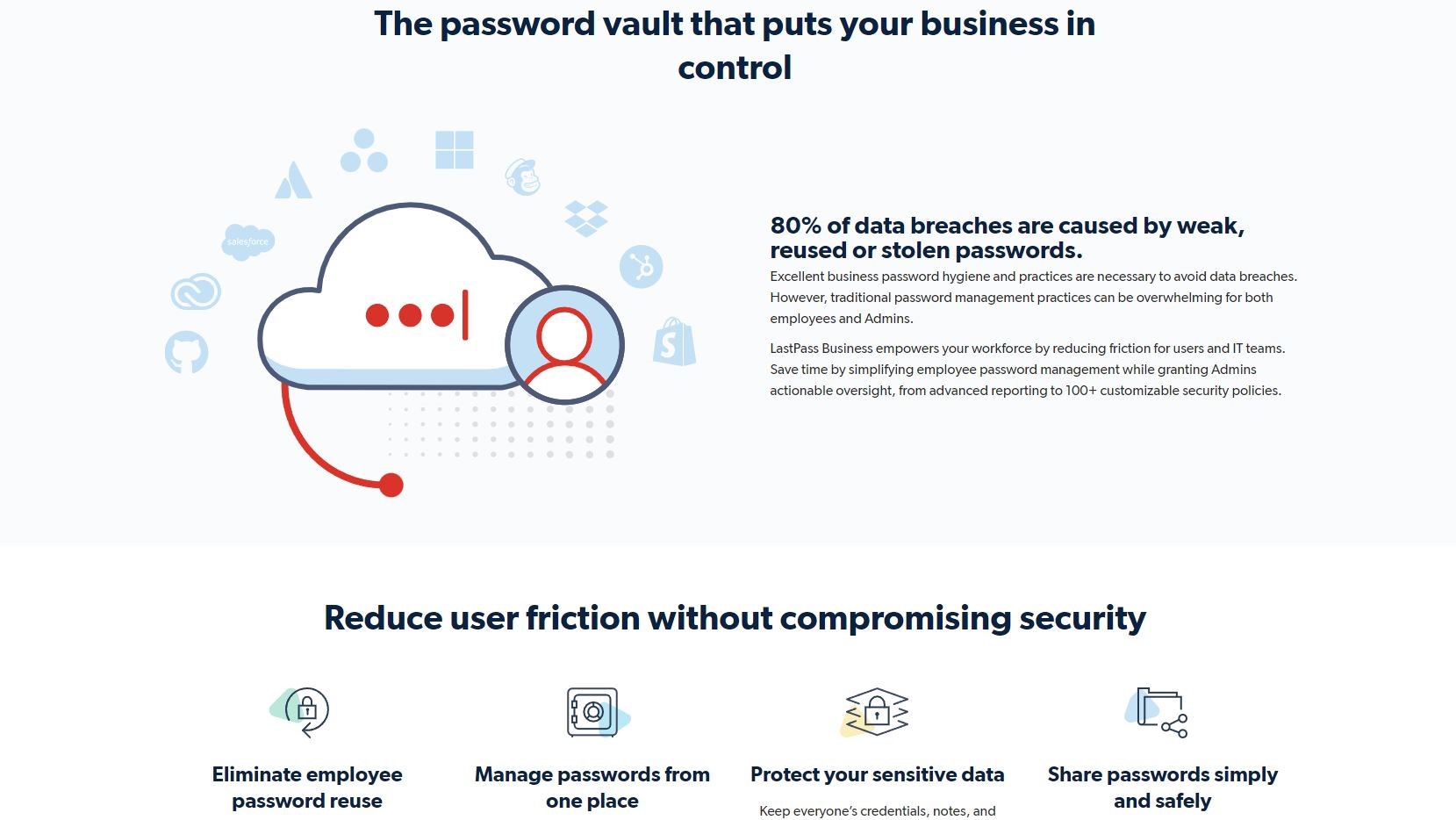
LastPass: Setup
Whether it’s your smartphone, tablet, or computer, setting up LastPass correctly is the cornerstone of enhancing your online security.
Step 1: Creating Your Account
Begin your journey by visiting the LastPass website or downloading the LastPass app from your device’s app store. You'll need to create an account by providing your email address and setting a strong master password. This master password is pivotal as it will be the only password you need to remember. Make sure it’s robust, unique, and known only to you, as it locks and unlocks your entire vault of passwords.
Step 2: Adding the LastPass Browser Extension
For those setting up on a computer, integrating LastPass with your browser is a breeze. Navigate to the download section on the LastPass website and select the appropriate extension for your browser. Chrome, Firefox, Safari, and Edge all support LastPass. Install the extension and log in using the master password you just created. This extension will automatically capture and fill passwords as you surf the internet.
Step 3: Importing Existing Passwords
If you've been managing your passwords in another software or browser, LastPass makes it easy to import them. Once logged into LastPass, head to the 'Password Vault' and look for the 'Import' option. LastPass can import data from various sources, ensuring you don’t have to manually re-enter all your credentials. This step is crucial for consolidating and securing all existing online accounts.
Step 4: Organizing Your Vault
Once your passwords are imported, spend some time organizing your vault. Create folders for different types of accounts like social media, banking, or entertainment. LastPass allows you to categorize and even share your passwords securely with family or team members if necessary. This organization aids in quickly locating and managing your credentials.
Step 5: Setting Up Multi-Factor Authentication
For an added layer of security, set up multi-factor authentication (MFA) on your LastPass account. This can usually be configured under the 'Account Settings' area of your LastPass vault. You can use options like biometric information, a mobile app, or a hardware token as your second form of authentication.
Step 6: Installing LastPass on Other Devices
To ensure seamless access to your accounts on all devices, install the LastPass app on other mobile devices or tablets you own and log in. With LastPass, syncing across devices happens automatically, so your passwords are always up-to-date regardless of where you access them from.
Step 7: Using LastPass for Password Generation and Secure Notes
Lastly, take full advantage of LastPass features like generating strong passwords for your new online account sign-ups. Also, use LastPass Secure Notes to store other sensitive information such as membership numbers, software licenses, or sensitive documents that benefit from robust encryption.
Congratulations! You’ve successfully set up LastPass. With all your passwords stored securely and efficiently, navigating your digital life will now be simpler and more secure. Regularly update your master password and review your vault for any old or compromised passwords. With LastPass, rest assured that your digital security is fortified.
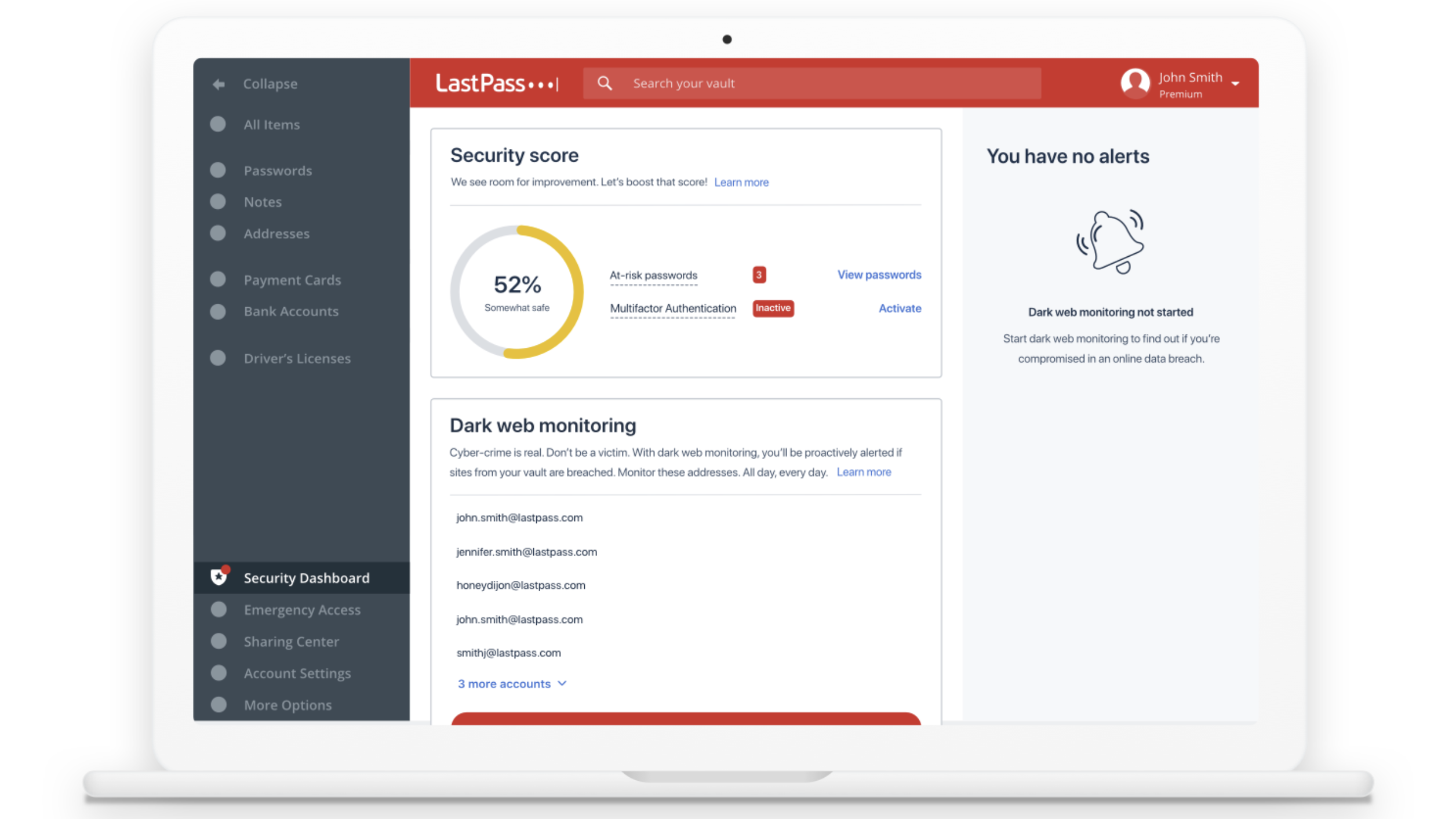
LastPass: Interface and performance
Businesses will be glad to know that LastPass comes with password sharing, password generation, emergency access, one-touch login, and automatic syncing of all data.
Combining password management and MFA enables LastPass to secure every access point used by your business devices with single sign-on for over 1,200 integrated applications.
Advanced administrator controls also enable IT administrators to leverage over 100 policies for user management and data control. This makes it one of the most customizable password management platforms available.
The LastPass applications perform admirably, and in our test, we had no negatives to report. Syncing was efficient and with little lag, and working across multiple devices and browsers was as seamless as the company advertises.
It’s also one of the better-looking apps out there, with clear, easy-to-use menus and distinct sections for passwords, payment details, and the security dashboard. There’s no isolated area for IDs like drivers’ licenses and passports, but you can keep this information in the area designed for notes.
The applications themselves are well-designed, and the user interface is easy to navigate. We’ve tested the application on Windows 10 and 11, macOS, iOS, and Android, and were impressed with all of them.
LastPass: Passkeys
In June 2023, LastPass announced that passkeys are finally coming to its platform by the end of the year, specifically across web, extension, and app experiences, where LastPass will create and save passkeys for eligible websites.
The company hopes that this could even attract a new group of users to the password manager because the passkeys will work on any device that LastPass works on. This means iPhone users who run Windows on their desktop will just be able to use LastPass, instead of having to scan their desktop with their smartphone.
Keeping up-to-date with trends has clearly been a priority for LastPass, which also announced late in 2022 that it would be bringing password management to the metaverse with its Meta Quest app. With the launch of the Apple Vision Pro around the corner, it’s possible that the company already has an app in development for that, too.
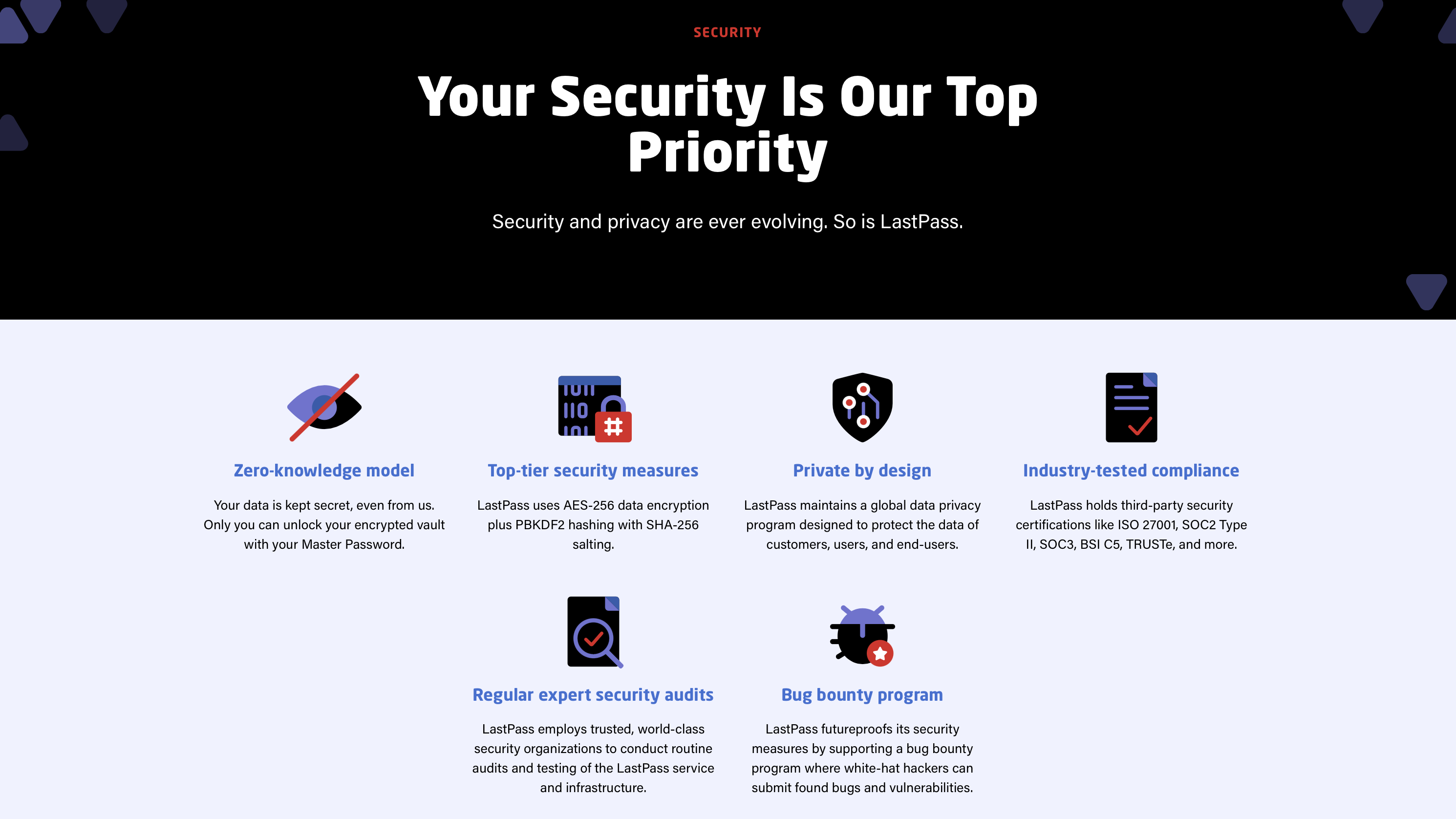
LastPass: Security
Security policy can make or break a password management provider. Fortunately, LastPass is recognized as one of the most highly secure password managers available. The LastPass platform end-to-end encrypts all data using 256-bit AES encryption and uses advanced Transport Layer Security to prevent in-transit attacks.
Also, as is industry standard, LastPass does not store users’ master passwords or authentication keys locally or on its servers. So no one, including LastPass, can access a user’s encrypted data remotely.
We were also particularly impressed by LastPass’s frequent external auditing and transparent incident response protocol. This means that if there are any weaknesses in the LastPass system, they are quickly identified and addressed.
Finally, the LastPass bug bounty program adds a community-level pillar to the platform’s security framework and further protects LastPass from bugs and software weaknesses, which demonstrates that the company holds a high level of accountability.
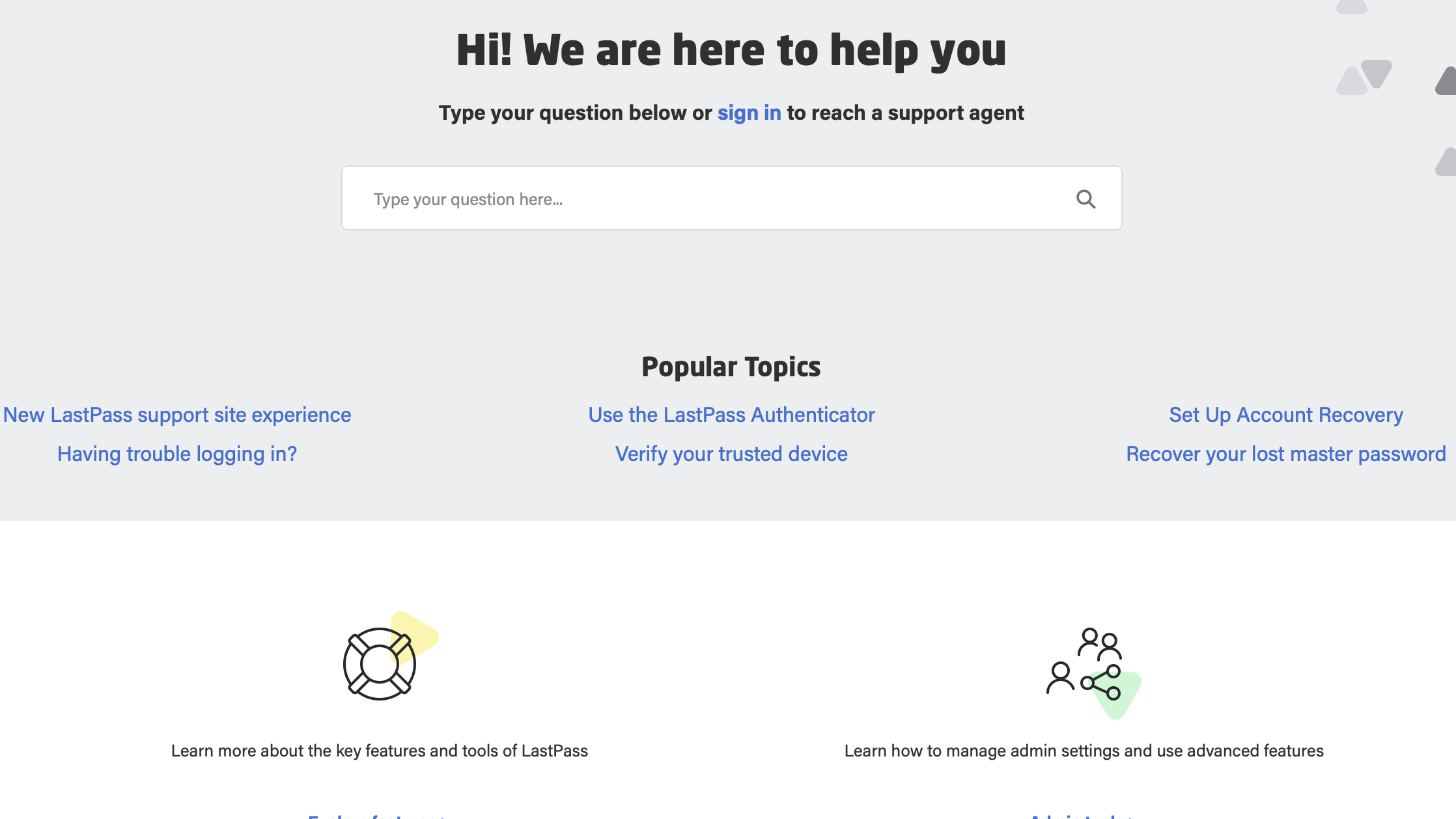
LastPass: Customer support
Both businesses and individuals can avail themselves of the LastPass forums. The forums page contains threads on numerous business-related topics, and we were able to find advice for many niche problems. There are loads of help articles, too.
For issues that can’t be solved by exploring the forum and articles, free online training and how-to guides are also available. Email support is readily available, too, but only certain plans get phone support.
LastPass: The competition
Although LastPass is feature-rich and highly affordable, there are cheaper options that might appeal to businesses on a tight budget.
For example, Sticky Password is cheaper than LastPass, with similar feature sets and security protocols. Another strong competitor is N-Able Passportal business password manager as well as Norton's password manager. You should also consider our comparison of 1Password and LastPass.
LastPass: Final verdict
LastPass is one of the best password managers available, and business leaders or IT administrators would do well to consider it for their organization. Advanced features, top-notch security, and centralized administrator controls and analytics all play their role in this superb password management solution.
Despite its advanced features, LastPass is still highly affordable in most cases, and this contributes significantly to our favorable opinion of the platform. However, if you’re looking for a free account only and you’re not willing to fork out a monthly fee, chances are you’d be better off with something that can support multiple signed in sessions simultaneously like Bitwarden or one of the software giants’ own solutions, like iCloud Keychain or Google Password Manager.
What to look for in a password manager
In an era where data breaches and cybersecurity threats loom large, ensuring the safeguarding of sensitive information is paramount for businesses of all sizes. A robust password manager is no longer a luxury but a necessity for companies striving to protect their digital assets. However, with a plethora of options available, choosing the right password manager can seem daunting. Here’s a detailed guide on what companies should look for when selecting a password manager, ensuring they pick a tool that not only secures their data but enhances overall operational efficiency.
The cornerstone of any password manager is its security features. Companies should prioritize services that offer advanced encryption standards, such as AES-256 bit encryption, to ensure that all data stored within the manager is impervious to cyber-attacks. Additionally, consider password managers that provide zero-knowledge architecture, meaning even the service provider cannot access your data. Features like two-factor or multi-factor authentication (MFA) add an extra layer of security, making it significantly harder for unauthorized individuals to gain access to your accounts.
For businesses, it's crucial to have granular control over who accesses what information. A password manager that offers customizable user permissions and roles enables companies to manage access based on the employee's role and responsibilities. The ability to easily add and revoke access, create user groups, and monitor who accessed what information and when helps maintain security protocols and ensures compliance with various regulatory standards.
Given the diverse technological ecosystem within most companies, a password manager must be compatible across different platforms and devices. Whether your team uses Windows, macOS, Android, or iOS, the password manager should offer seamless integration and synchronization across all platforms, ensuring that employees can access their secure passwords no matter the device or browser they use.
An often-overlooked aspect of implementing new software is the user experience. The best password managers combine advanced security features with user-friendly interfaces. Look for a solution that offers intuitive navigation, easy setup, and minimal maintenance. Moreover, consider the streamlined processes for adding new passwords, retrieving stored information, and sharing credentials among team members. A password manager that is cumbersome to use can lead to poor adoption rates among your workforce.
For enhanced security and compliance, choose a password manager that provides comprehensive audit and reporting tools. These features empower companies to monitor password hygiene, identify weak or reused passwords, and detect unusual access patterns. Regular reports can help you stay ahead of potential vulnerabilities and reinforce best practices among your team.
Choose a password manager that can grow with your company. Scalability is essential, as the number of users, amount of sensitive data, and complexity of your business needs will evolve over time. Opt for a solution that makes it easy to add licenses or features as your business expands and your security requirements become more sophisticated.
Effective customer support can significantly impact the user experience. Look for a password manager that offers reliable, 24/7 customer support through multiple channels, including live chat, email, and phone. Service Level Agreements (SLAs) that guarantee uptime and quick resolution times can also offer peace of mind that any issues will be swiftly handled.
Finally, while not compromising on security and functionality, consider the cost efficiency of the password manager. Many services offer tiered pricing based on the number of users, so you pay for only what you need. Additionally, weigh the long-term benefits of enhanced security and efficiency against the investment in the password manager.
Selecting the right password manager is a critical decision for businesses aiming to bolster their cybersecurity posture. By focusing on security features, user access controls, cross-platform compatibility, ease of use, audit and reporting capabilities, scalability, customer support, and cost efficiency, companies can find a solution that not only secures their digital assets but also supports their operational objectives. Remember, in the digital age, your passwords are as valuable as the information they protect—choosing the right manager is paramount to safeguarding your company's future.
Mike has worked as a technology journalist for more than a decade and has written for most of the UK’s big technology titles alongside numerous global outlets. He loves PCs, laptops and any new hardware, and covers everything from the latest business trends to high-end gaming gear.
